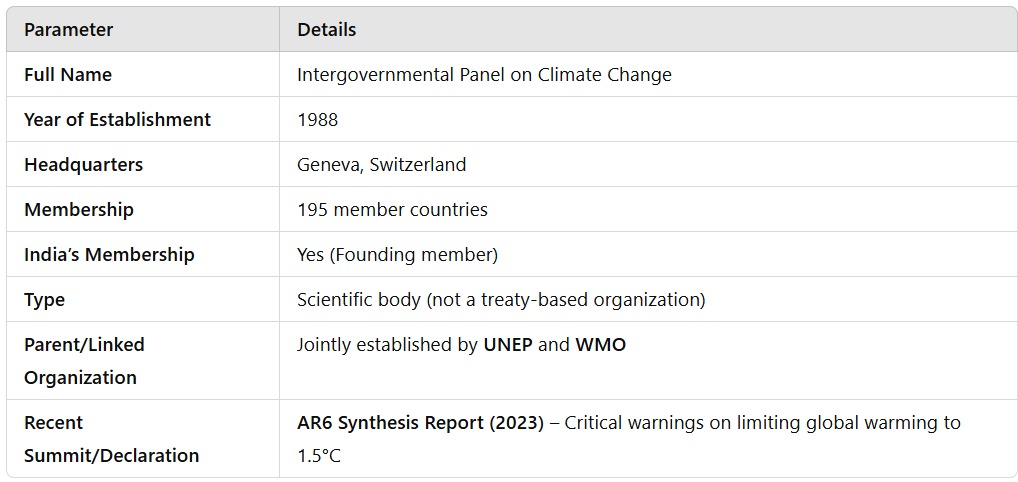1. Intergovernmental Panel on Climate Change (IPCC)


Key Objectives and Mandate
The IPCC is the world’s foremost authority on climate science, established to provide objective, scientific assessments on:
The physical basis of climate change
Impacts, vulnerabilities, and adaptation strategies
Mitigation pathways and response options
It does not conduct original research, but compiles, reviews, and synthesizes thousands of scientific studies globally. It serves as the scientific backbone for UNFCCC negotiations and climate policymaking.
Organizational Structure
IPCC Panel: Comprises representatives from all member states
Working Groups:
WG I – Physical science basis
WG II – Impacts, adaptation, vulnerability
WG III – Mitigation strategies
Task Force on GHG Inventories – Assists nations in tracking emissions
Bureau and Technical Support Units coordinate preparation of reports
Reports undergo a rigorous multi-stage peer review process
India’s Role and Relevance
Indian scientists have regularly served as Lead Authors and Coordinators
Example: Dr. R. Krishnan from IITM in AR6
IPCC data is used for India’s:
National Action Plan on Climate Change (NAPCC)
State Action Plans (SAPCCs)
Greenhouse gas inventory and climate projections
India strongly supports equity in carbon space and uses IPCC data to argue for climate justice and differentiated responsibility in COP discussions
Key Initiatives and Developments
Sixth Assessment Report (AR6) cycle (2021–2023):
Declared climate change to be unequivocally human-induced
Highlighted the narrowing window to keep warming under 1.5°C
Stressed on climate-resilient development, adaptation finance, and global inequality
Special Report on Global Warming of 1.5°C (SR15): Influenced Paris climate targets
IPCC assessments are now key inputs for Global Stocktakes under the Paris Agreement
Next cycle (AR7) to begin around 2025
Additional Facts
Shared the 2007 Nobel Peace Prize with Al Gore
Uses Representative Concentration Pathways (RCPs) and Shared Socioeconomic Pathways (SSPs) to model future scenarios
Reports are used by UN, World Bank, national governments, and NGOs for policy formulation
Forms the scientific base for climate litigation and carbon pricing models
Relevance for UPSC Exam
Prelims: Questions on AR6 highlights, report names, RCPs/SSPs, Nobel Prize, and IPCC’s relation to UNEP/WMO
Mains (GS3):
Climate science in policy
Climate justice and equity
Science-policy interface in governance
Essay & Interview: Critical for climate essays, especially on topics like climate emergency, science vs politics, or ethical responsibility toward future generations
